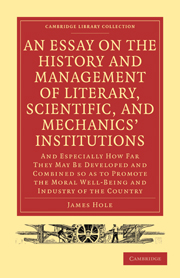 An Essay on the History and Management of Literary, Scientific, and Mechanics' Institutions
An Essay on the History and Management of Literary, Scientific, and Mechanics' Institutions Book contents
- Frontmatter
- ADVERTISEMENT
- Contents
- MECHANICS' INSTITUTES
- APPENDICES
- A Extracts from Memorials to the Royal Commissioners for the Exhibition of the Industry of all Nations, praying for the Establishment of a Central Institution of Arts and Manufactures
- B Subjects which ought to be known in various Trades
- C Amusements
- D Exhibitions of Works of Art, Objects illustrative of General and Practical Science, Specimens of Natural History, and Productions of Manufaturing Skill
- E Itinerating Libraries for Villages
B - Subjects which ought to be known in various Trades
Published online by Cambridge University Press: 05 October 2010
- Frontmatter
- ADVERTISEMENT
- Contents
- MECHANICS' INSTITUTES
- APPENDICES
- A Extracts from Memorials to the Royal Commissioners for the Exhibition of the Industry of all Nations, praying for the Establishment of a Central Institution of Arts and Manufactures
- B Subjects which ought to be known in various Trades
- C Amusements
- D Exhibitions of Works of Art, Objects illustrative of General and Practical Science, Specimens of Natural History, and Productions of Manufaturing Skill
- E Itinerating Libraries for Villages
Summary
The following are answers in reply to inquiries as to the kind of instruction which ought to be given in Mechanics' Institutions to those following various trades. All the writers are men, not only of great intelligence, but of great practical experience in the various occupations to which they refer.
Engineers, &c.
The knowledge most required by them is thus stated by a Liverpool engineer:—“Mathematics, cube and square roots (to find the strength of rods and shafts); mensuration (to find the weights of machinery); practical geometry, power of levers, mechanical drawing.”
In a large foundry near Manchester, one of the workmen recommends the study of the various kinds of motions, of geometry, in fact; and recommends as books, “Grier's Calculator and Dictionary,” “Hibbert's Cyclopaedia,” “Lardner's Steam Engine,” and the Mechanics' and Engineers’ Magazines of London and Glasgow.
The foreman of the smiths in this foundry says, “There is but one way to make a smith,—by practice at the fire, and nothing else is required.” In the same establishment I was informed “the greater part of the workmen have not received any assistance whatever from books, or from any subject of study pursued out of the shop; indeed, it is notorious that some of our most skilled workmen are, in other respects, grossly ignorant, to the extent in one or two instances of not being able to read or write, experience and practice alone supplying the necessary skill.”
- Type
- Chapter
- Information
- An Essay on the History and Management of Literary, Scientific, and Mechanics' InstitutionsAnd Especially How Far They May Be Developed and Combined so as to Promote the Moral Well-Being and Industry of the Country, pp. 167 - 170Publisher: Cambridge University PressPrint publication year: 2010First published in: 1853


